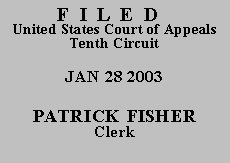

| UNITED STATES OF AMERICA,
v.
OSCAR MOSQUEDA-BELTRAN |
No. 02-1245
D.C. No. 01-CR-63-N |
On appeal, counsel for Mosqueda-Beltran filed an Anders brief and moved to withdraw as counsel. See Anders v. California, 386 U.S. 738, 744 (1967) (allowing attorneys who believe an appeal to be frivolous to advise the court of that fact, request permission to withdraw from the case, and submit a brief citing to those portions of the record that arguably support the appeal). In the Anders brief, counsel asserts that the defendant's sentence was not imposed contrary to law, as a result of an incorrect application of the sentencing guidelines, or in excess of the applicable guideline range. (Aplt. B. at 8.) Mosqueda-Beltran was afforded an opportunity to respond to the Anders brief, but failed to do so. (Ct. of App. Dkt. #20.)
We have fully examined the proceedings as required by Anders, id., and conclude that the defendant's appeal is wholly frivolous. The district court properly calculated the offense level and criminal history category. (ROA IV at 67; ROA V at 2, 412.) The sentence imposed was the low end of the applicable guideline range, which is what the United States recommended as part of a plea agreement with Mosqueda-Beltran. (ROA IV at 13.) In this case, the district court's sentence was neither contrary to law nor an incorrect application of the sentencing guidelines. Therefore, 18 U.S.C. § 3742(a)(1) and (2) are not implicated.
We can find no issues in this case that might properly be the subject of an appeal. Accordingly, counsel's motion to withdraw is GRANTED and Mosqueda-Beltran's conviction is AFFIRMED.
ENTERED FOR THE COURT
David M. Ebel
Circuit Judge
*.After examining appellant's brief and the appellate record, this panel has determined unanimously that oral argument would not materially assist the determination of this appeal. See Fed. R. App. P. 34(a)(2) and 10th Cir. R. 34.1(G). The case is therefore ordered submitted without oral argument. This order and judgment is not binding precedent, except under the doctrines of law of the case, res judicata, and collateral estoppel. The court generally disfavors the citation of orders and judgments; nevertheless, an order and judgment may be cited under the terms and conditions of 10th Cir. R. 36.3.